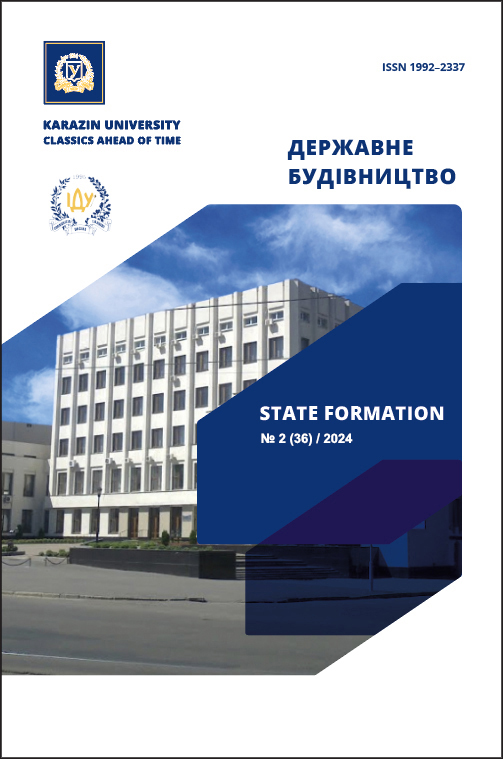Integrated approaches and tools for ensuring the efficiency of multilevel governance in crisis conditions.
Abstract
The article examines the theoretical foundations of integrated multilevel governance, in particular, the concept of results-based management (RBM) and its role in ensuring the effectiveness of multilevel governance in Ukraine is discussed. The formation of a new paradigm of multilevel governance based on the convergence of various management concepts of public administration in combination with integrated management approaches is substantiated. It is noted that a comprehensive integrated approach, on the one hand, involves preserving the basic democratic principles of multilevel governance, and on the other, is aimed at strategic orientation, results-based management, quality management, risk management and crisis response to create a comprehensive system of multilevel governance under conditions of uncertainty and hybrid threats. The integration of Results-Based Management (RBM) and Total Quality Management (TQM) approaches is proposed to increase the effectiveness of crisis management, combining a strategic focus on results with continuous improvement of the quality of processes. This will allow public organizations not only to effectively respond to crises, but also to prevent their occurrence through proactive management at different levels, focusing on the subnational level, which includes regional, local and subnational levels, to conduct continuous risk analysis and improve processes, which will help ensure the long-term sustainability of public organizations in conditions of uncertainty.
Downloads
References
Bezverkhnyuk, T., Sakhanenko, S.E., Topalova, E.Kh. (2008). European standards of governance at the regional level. Odesa: ORIDU NADU. 328 p. [in Ukrainian].
Glebova, A.O., Karchevsky, B.O. (2015). Quality management systems in the enterprise under the conditions of European integration processes. Global and national problems of economy. no. 8. 352–356. [in Ukrainian].
Deliya, O.V. (2015). Governance as a conceptual approach to understanding public administration. State administration: improvement and development, no. 7. URL: http://www.dy.nayka.com.ua/?op=1&z=869 [in Ukrainian].
Zeytullaeva, E. (20210). Multilevelness as a theoretical concept and methodology for managing social processes. Current problems of public administration, vol. 2. no. 83, 15–20. DOI: https://doi.org/10.35432/1993-8330appa2832021 [in Ukrainian].
Kolodiy, A. (2012). The concept of public (new) governance in its application to democratic and transitional systems. Democratic governance: Scientific bulletin. is. 10, 1–22. [in Ukrainian].
Kohalyk, Kh.M. (2012). Good governance: principles and characteristics. Effectiveness of public administration. is. 33, 50–57. URL: http://nbuv.gov.ua/UJRN/efdu_2012_33_7 [in Ukrainian].
NADS introduces results-based management tools in the civil service. NADS. URL: https://nads.gov.ua/news/nads-zaprovadzhuie-na-derzhavnii-sluzhbi-instrumenty-upravlinnia-oriientovanoho-na-rezultat-results-based-managemen t Accessed July 31, 2023. [in Ukrainian].
Project “Support for Government Reforms in Ukraine” (SURGe). Decentralization. URL: https://decentralization.ua/donors/surge [in Ukrainian].
Suvorov, V.P. (2024). Integrated multi-level governance and convergence of public administration concepts in the face of global challenges. State Construction, no. 1 (35), 98–109. DOI: https://doi.org/10.26565/1992-2337-2024-1-08 [in Ukrainian].
Center for Adaptation of the Civil Service to the Standards of the European Union. (2024). European Guidelines in the Development of the Civil Service. URL: https://center.gov.ua/pres-tsentr/materials/itemlist/search Accessed October 08, 2024. [in Ukrainian].
RBM Methodology in Strategic Community Planning: How to Achieve Results Instead of Planning Processes. (2024). Decentralization. SURGe Project URL: https://decentralization.ua/news/18703 Accessed October 02, 2024.
Ansell, C., & Boin, A. (2019). Taming Deep Uncertainty: The Potential of Pragmatist Principles for Understanding and Improving Strategic Crisis Management. Administration & Society 51(7). DOI: https://doi.org/10.1177/0095399717747655
Baubion, C. (2013). “OECD Risk Management: Strategic Crisis Management”. OECD Working Papers on Public Governance, no. 23, OECD Publishing, Paris, DOI: https://doi.org/10.1787/5k41rbd1lzr7-en
Bevir Mark (2012). Governance: A very short introduction. Oxford: Oxford University Press, 132.
Boin, A., & Lodge, M. (2016). Designing Resilient Institutions for Transboundary Crisis Management: A Time for Public Administrat H a n db ook pplying R concepts and tools for a be er urban future ion. Public Administration, 94(2), 289-298. DOI: https://doi.org/10.1111/padm.12264
Bongs Lainjo (2019). Results Based Management (RBM): An antidote to program management. Journal of administrative and business studies. DOI: https://doi.org/10.20474/jabs-5.1.5
Deming, W.E. (1986). Out of the crisis. Cambridge, MA: Center for Advanced Engineering Study, Massachusetts Institute of Technology. MIT Press.
Governance for sustainable human development. A UNDP policy document. United Nations Development Programme. 1997. January. URL: http://www.pogar.org/publications/other/undp/governance/undppolicydoc97-e.pdf
Hananta, S.A., Susyanti, J. (2024). Implementation of Total Quality Management (TQM) in Organizations and Business. International Journal of Economics and Management Research 3(2):322-332. DOI: https://doi.org/10.55606/ijemr.v3i2.227
Hopkin, P. (2018). Fundamentals of Risk Management: Understanding, Evaluating and Implementing Effective Risk Management. London: Kogan Page Publishers. URL: https://books.google.co.uk/books?hl=en&lr=&id=bzFiDwAAQBAJ&oi=fnd&pg=PP1&dq=16.%09Hopkin
Hufty Marc. (2011). Investigating Policy Processes: The Governance Analytical Framework (GAF). In: Wiesmann, U., Hurni, H., et al. eds. Research for Sustainable Development: Foundations, Experiences, and Perspectives. Bern : Geographica Bernensia. 403–24.
Karamyshev, D. (2018). Global development imperatives: focus on Global Governance. Public Administration and Regional Development, (2), 365–388. DOI: https://doi.org/10.26693/pard2018.02.365
Kusek, J.Z., Rist, R.C. (2015). Ten Steps to a Results-Based Monitoring and Evaluation System: A Handbook for Development Practitioners. World Bank Publications. URL: https://documents1.worldbank.org/curated/en/638011468766181874/pdf/296720PAPER0100steps.pdf
Mintzberg, H. (2017). Managing the Myths of Health Care. Berrett-Koehler Publishers.
Oakland, J.S. (2014). Total Quality Management and Operational Excellence: Text with Cases (4th ed.). Routledge. DOI: https://doi.org/10.4324/9781315815725
Rhodes, R.A. (2010). The New Governance: Governing without Government. From Government to Governance / Bellamy R. and Palumbo A.(eds.) : Ashgate/ pp. 3–4.
UNDP (2009). Handbook on Planning, Monitoring and Evaluating for Development Results. United Nations Development Programme. URL: https://mandeguidelines.iom.int/sites/g/files/tmzbdl2306/files/2023-03/pme-handbook.pdf
UN-Habitat (2017). Results-Based Management Handbook. Applying RBM concepts and tools for a better urban future. URL: https://unhabitat.org/sites/default/files/2019/05/un-habitat_rbm_handbook_complete_0_0.pdf
Van Dooren, W., Bouckaert, G., Halligan, J. (2015). Performance management in the public sector (2nd Edition) Masters in Public Management.: Routledge.
Wael Omran Aly (2015). A Framework for Results Based Management to The Public Sector in Egypt: Challenges and Opportunities. Journal of Public Administration and Governance 5(4). DOI: https://doi.org/10.5296/jpag.v5i4.8406
Yong, J., Wilkinson, A. (1999). The state of total quality management: a review. The International Journal of Human Resource Management, 10(1), 137–161. DOI: https://doi.org/10.1080/095851999340684

